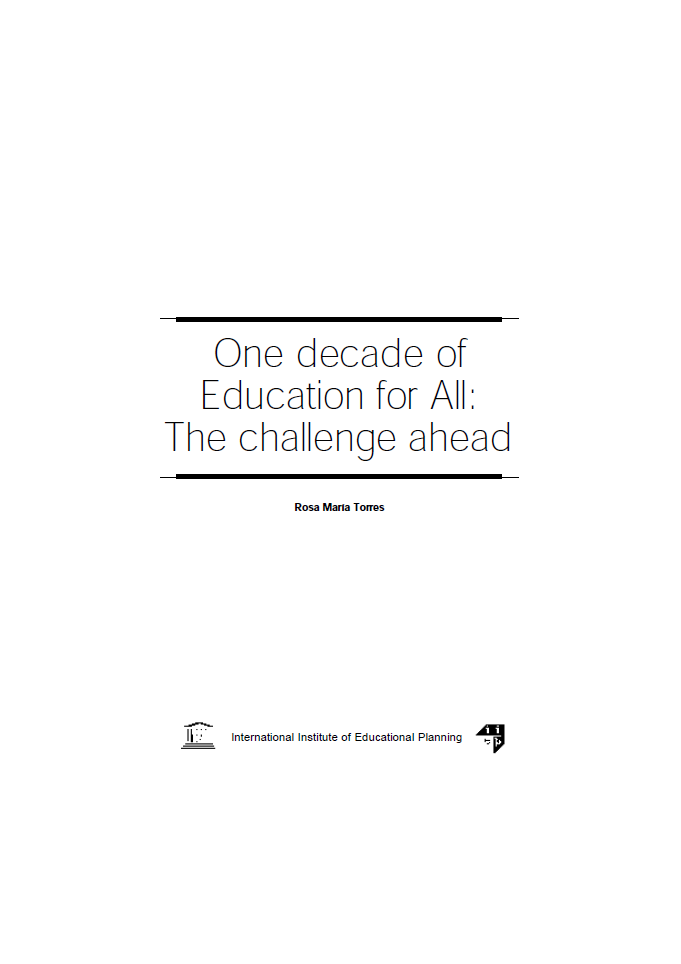One decade of Education for All : The challenge ahead
Abstract
Education for All helped revitalize an education reform movement that started well before 1990 in several developing countries. Developments since 1990 are neither uniform nor linear. Major progress has been made on some fronts, whereas stagnation or even deterioration is manifest on others. Of course, there are significant differences between regions and countries, and within each country. New problems have emerged from new solutions. The situation is not clear-cut; achievements are unstable and vulnerable. It is thus more appropriate to speak of trends, tensions, dilemmas, contradictions and future challenges rather than of successes and failures, achievements and setbacks. It is too early to gauge the efficiency of the EFA initiative in terms of the goals set. Even if the results of the decade assessment (the 18 indicators) will be available in the year 20005 , the real impact will only become apparent in a few years, not only due to the traditional delay of educational statistics (and to the quantitative and qualitative aspects these 18 indicators will not be able to cover), but also because of the time taken to perceive and process changes in the education field. However, analyses and assessments performed to date enable us to identify certain trends and draw some general conclusions, more in terms of qualitative aspects and processes, rather than quantitative results. This paper does not intend to evaluate the adherence to quantitative goals set within the scope of EFA. It approaches Education for All as a concept and a strategy, rather than as a goal in itself. More specifically, it focuses on analyzing if, and to what extent, the renewed vision of education, educational policy and international cooperation in education that was outlined in Jomtien, has been achieved. Indeed, the "expanded vision of basic education" was inseparable from attaining the goals set.
Collections
Related items
Showing items related by title, author, creator and subject.
-
Proyecto Educativo Nacional al 2021 : balance y recomendaciones 2018-2020
CNE. Consejo Nacional de Educación; Guzmán Rivas, Almendra; Rosas, Ricardo; Estefanía Sánchez, María Teresa (PEConsejo Nacional de Educación, 2021-07)El Proyecto Educativo Nacional (PEN) propone un horizonte común que oriente las políticas educativas y propicie su continuidad. El PEN fue desarrollado en un momento de transición democrática para el país y, luego de un ... -
Proyecto Educativo Nacional, PEN 2036 : el reto de la ciudadanía plena
CNE. Consejo Nacional de Educación (Consejo Nacional de Educación, 2020-07)La actualización del Proyecto Educativo Nacional —que el Consejo Nacional de Educación presenta al país y a sus autoridades en virtud del encargo recibido por parte del Ministerio de Educación— tiene como intención definir ... -
Elementos para un Plan de desarrollo de la educación peruana (PDEP) 2026 - 2031
Acosta Pantlik, Maritza; Aller Zárate, Román; Alvarado Cerdán, Silvia; Barr Rosso, Paul; Cárdenas Pinto, Tania; Espinoza Peralta, Gustavo; Lema Martínez, Yanina; Quezada Reyes, Zoila; Reyna Motta, Diana Milagros; Rojas Luján, Francisco Fidel; Rosas Lezama, Ricardo; Soto Hurtado, Daniel; CNE. Consejo Nacional de Educación (PEConsejo Nacional de Educación, 2025-11)A cinco años de la aprobación legal del PEN al 2036, persisten problemas estructurales que obstaculizan el logro de sus propósitos: una vida ciudadana afectada por la débil cultura ética, cívica y de legalidad, la desconfianza ...

